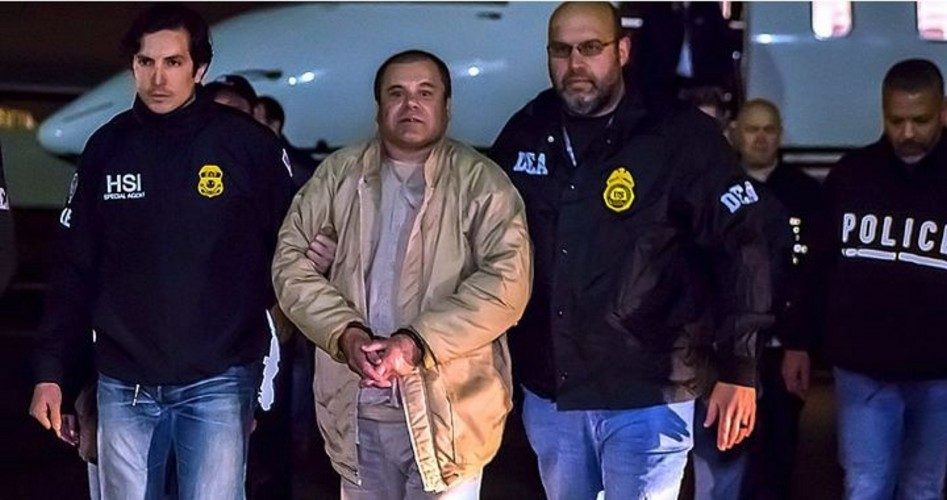
When Senator Ted Cruz (R-Texas) introduced his bill — the Ensuring Lawful Collection of Hidden Assets to Provide Order (EL CHAPO) Act — on Tuesday, he said the $14 billion seized from the Mexican drug lord would help build President Trump’s wall:
$14 billion dollars will go a long way toward building a wall that will keep Americans safe and hinder the illegal flow of drugs, weapons, and individuals across our southern border.
The money isn’t available just for the taking, added Cruz:
The U.S. government is currently seeking the criminal forfeiture of more than $14 billion in drug proceeds and profits from El Chapo, the former leader of the Sinaloa drug cartel who was recently extradited to the U.S. to face criminal prosecution for numerous alleged drug-related crimes, including conspiracy to commit murder and money laundering.
As part of the agreement between Mexico and U.S. authorities, El Chapo won’t face the death penalty, but his confiscated assets might be available if Cruz’s bill passes the Senate and the House, and is signed into law by the president. Confiscated assets such as these are usually directed to law enforcement efforts in the United States.
Cruz told Tucker Carlson on Fox News’s Tucker Carlson Tonight on Wednesday that it’s “only fitting” that drug money be used to build the wall:
These drug cartels are the ones crossing the border with impunity, smuggling drugs, smuggling narcotics, engaged in human trafficking. They’re the ones violating our laws and it’s only fitting that their ill-gotten gains fund securing the border.
Cruz’s bill specifically targets El Chapo’s assets for use in building the wall:
All illegally obtained profits resulting from any criminal drug trafficking enterprise led by Joaquin Archivaldo Guzman Loera (commonly known as “El Chapo”), which are criminally forfeited to the United States Government as a result of the conviction of [El Chapo] … shall be reserved for security measures along the border between the United States and Mexico, including the completion of a wall along such border, for the purpose of stemming the flow of illegal narcotics into the United States and furthering the Nation’s security.
It was Trump’s White House Chief of Staff Reince Priebus who first suggested that drug profits might be used to help build the wall. In January Priebus told CBS’s Face the Nation that the administration was considering a number of options for funding the estimated $21 billion project:
It can either be through a tax on goods coming across the border, it could be through tax reform and a formula on import and export taxes and credits, it could be on drug cartels, and it could be on people that are coming here illegally and paying fines. [Emphasis added.]
Or it could be … all of the above. There’s a buffet of options that we have in order to pay for this wall.
Two weeks later Representative James Sensenbrenner (R-Wis.) introduced his BUILD WALL Act (Build Up Illegal Line Defenses With Assets Lawfully Lifted), proposing increased asset forfeitures along with a restructured allocation of funds already seized from drug traffickers. Said Sensenbrenner at the time:
If we do nothing, we put the people of this nation at risk, as well as allow illegal immigrants to take away jobs, opportunities and social funding from U.S. citizens — all at the expense of the American taxpayer. The BUILD WALL Act is a creative solution to a complex problem.
When quizzed about his bill in March, Sensenbrenner reiterated the case that drug lords should rightly pay for the wall:
This is a way to fulfill the president’s desire to have Mexico pay for the wall. Having the money seized from Mexican drug cartels would mean that bad Mexicans would end up paying for the wall — the bad Mexicans [who] have been terrorizing the good Mexicans with crime and kidnappings and murders within Mexico itself.
Few have considered just how effective the wall might be in “hindering” the drugs flowing into the country, especially those with short memories. It’s helpful to remember that Al Capone considered his business as “legitimate”: just providing liquor to thirsty Americans during Prohibition, and considering federal restrictions as just obstacles to be overcome in the process. He used bribery, extortion, and murder threats to overcome those obstacles, providing history with a notable proverb: “You can get much farther with a kind word and a gun than you can with a kind word alone.”
As Borderland Beat, the relatively unknown but highly regarded source of information about the border drug wars, recently noted: “With U.S. support Mexican authorities have been able to kill or capture 33 out of the 37 most dangerous cartel leaders. The recent extradition of Joaquin ‘El Chapo’ Guzman to the United States is a testament to the value of high-level cooperation between the two countries. As a result of these notable successes, several larger cartels have fractured and have descended into in-fighting.”
But they haven’t gone away. They have reorganized, are adapting to the new reality, and are continuing their drug trafficking. First, they consider themselves as businessmen providing a product to fill market demand. Thwarting border protections is an industry in its own right, whether it’s developing tunnels (with electric lights and air-conditioning) under the border, or creating false documentation to get their mules through border checkpoints. They still have immense resources and can buy all the talent they need to neuter any protective schemes the Trump administration might dream up.
When they wish to move large sums of cash across the border, the cartels have used “cloned” vehicles that resemble official cars. When that fails, they buy up and ship across the border vast numbers of gift cards, thus reducing law enforcement’s ability to track down the movement of money.
When drones become pesky, they develop countermeasures to defend against them. And they are developing “narco drones” of their own to deliver drugs across the border to the United States.
In addition, they have used their immense resources successfully to bribe hundreds of Department of Homeland Security employees who have taken in nearly $15 million from drug lords since 2006. As Borderland Beat notes, all this means “that a new border wall will not end or significantly reduce the capabilities and power of Mexican drug cartels. From the days of tequila smuggling into the United States during Prohibition, illicit trafficking across the southwest border has remained a constant.”
Films such as The Untouchables (1987) or, more recently, Lawless (2012) just touch on the horrors inflicted upon innocents as those illegal liquor merchants plied their wares, operating as simply businessmen doing their best to “meet a demand.”
Building the wall, even if using drug cartel profits, is likely to provide another lesson for those who have forgotten, or never learned, their history.
Photo of Joaquin Archivaldo Guzman Loera (commonly known as “El Chapo”): Immigration and Customs Enforcement
An Ivy League graduate and former investment advisor, Bob is a regular contributor to The New American magazine and blogs frequently at LightFromTheRight.com, primarily on economics and politics. He can be reached at [email protected].



